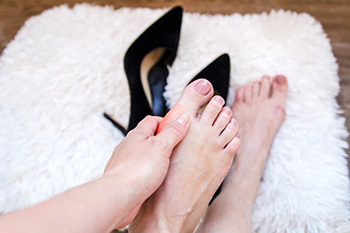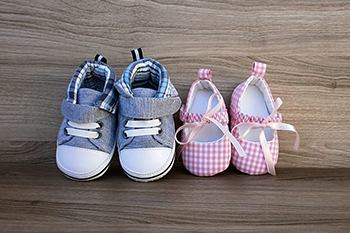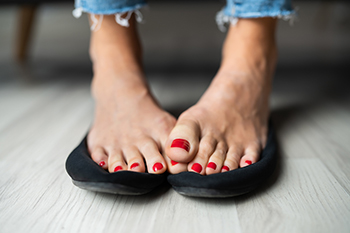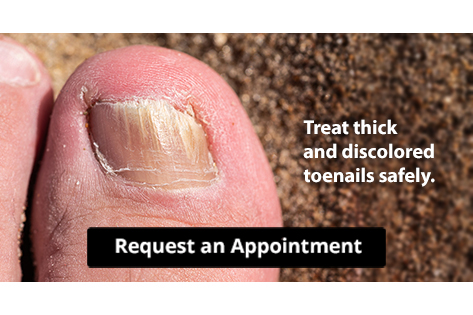Connect With Us
Blog
Items filtered by date: June 2024
Stop Your Toenail Fungus
How High Heels May Damage Your Feet

Wearing high heels regularly can lead to various types of foot damage. The unnatural position of the foot in high heels places excessive pressure on the ball of the foot, which can result in metatarsalgia, a painful inflammation of the metatarsal region. High heels also force the toes into a cramped position, often leading to bunions, hammertoes, and other deformities. The elevated heel shifts the body's weight forward, altering posture and putting additional stress on the knees and lower back. This unnatural alignment can cause chronic pain and long-term joint issues. Additionally, the lack of proper support in high heels can contribute to plantar fasciitis, characterized by severe heel pain. The risk of ankle sprains and fractures is also higher due to the instability of walking in high heels. Over time, the cumulative effect of these issues can lead to significant and sometimes irreversible foot and musculoskeletal problems, emphasizing the importance of moderating high-heel use and opting for more supportive footwear. If you have developed foot pain and feel it may be from wearing high heels, it is suggested that you speak to a podiatrist who can offer you treatment solutions in addition to guiding you toward safer footwear.
High heels have a history of causing foot and ankle problems. If you have any concerns about your feet or ankles, contact one of our podiatrists from DM Foot & Ankle Associates . Our doctors can provide the care you need to keep you pain-free and on your feet.
Effects of High Heels on the Feet
High heels are popular shoes among women because of their many styles and societal appeal. Despite this, high heels can still cause many health problems if worn too frequently.
Which Parts of My Body Will Be Affected by High Heels?
- Ankle Joints
- Achilles Tendon – May shorten and stiffen with prolonged wear
- Balls of the Feet
- Knees – Heels cause the knees to bend constantly, creating stress on them
- Back – They decrease the spine’s ability to absorb shock, which may lead to back pain. The vertebrae of the lower back may compress.
What Kinds of Foot Problems Can Develop from Wearing High Heels?
- Corns
- Calluses
- Hammertoe
- Bunions
- Morton’s Neuroma
- Plantar Fasciitis
How Can I Still Wear High Heels and Maintain Foot Health?
If you want to wear high heeled shoes, make sure that you are not wearing them every day, as this will help prevent long term physical problems. Try wearing thicker heels as opposed to stilettos to distribute weight more evenly across the feet. Always make sure you are wearing the proper shoes for the right occasion, such as sneakers for exercising. If you walk to work, try carrying your heels with you and changing into them once you arrive at work. Adding inserts to your heels can help cushion your feet and absorb shock. Full foot inserts or metatarsal pads are available.
If you have any questions please feel free to contact our office located in Lemont, IL . We offer the newest diagnostic and treatment technologies for all your foot and ankle needs.
Babies First Shoes

Selecting the first shoes for babies is an important decision, as it impacts their comfort and foot development. Opt for soft, flexible shoes made from breathable materials like leather or cloth, allowing natural movement and airflow. These materials provide gentle support without restricting the foot's growth. Look for shoes with a roomy toe box to accommodate the baby's developing toes and allow wiggle room. Flexible soles with good traction help prevent slipping while allowing for natural foot movement. Additionally, avoid shoes with stiff soles or tight, rigid structures, as they can hinder proper foot development and cause discomfort. Velcro or elastic closures ensure a snug fit without being too restrictive, making it easier to put on and take off. If you notice anything unusual about your child’s feet, it is suggested that you consult a podiatrist who can provide a comprehensive exam and address any questions you may have about appropriate footwear.
Making sure that your children maintain good foot health is very important as they grow. If you have any questions, contact one of our podiatrists of DM Foot & Ankle Associates . Our doctors can provide the care you need to keep you pain-free and on your feet.
Keeping Children's Feet Healthy
Having healthy feet during childhood can help prevent medical problems later in life, namely in the back and legs. As children grow, their feet require different types of care. Here are some things to consider...
Although babies do not walk yet, it is still very important to take care of their feet.
Avoid putting tight shoes or socks on his or her feet.
Allow the baby to stretch and kick his or her feet to feel comfortable.
As a toddler, kids are now on the move and begin to develop differently. At this age, toddlers are getting a feel for walking, so don’t be alarmed if your toddler is unsteady or ‘walks funny’.
As your child gets older, it is important to teach them how to take care of their feet.
Show them proper hygiene to prevent infections such as fungus.
Be watchful for any pain or injury.
Have all injuries checked by a doctor as soon as possible.
Comfortable, protective shoes should always be worn, especially at play.
If you have any questions please feel free to contact our office located in Lemont, IL . We offer the newest diagnostic and treatment technologies for all your foot and ankle needs.
Causes and Management of Sweaty Feet

Managing excessively sweaty feet, medically termed plantar hyperhidrosis, can be a frustrating and uncomfortable experience. Several factors contribute to this condition, including overactive sweat glands, hormonal changes, stress, and certain medical conditions like hyperthyroidism. Controlling sweaty feet begins with practicing good hygiene, including regular washing and drying of the feet, wearing moisture-wicking socks, and rotating shoes to allow them to air out properly. Additionally, choosing breathable footwear made from natural materials like leather can help reduce moisture buildup. Applying antiperspirant to the soles of the feet can also be effective in minimizing sweat production. In more severe cases, treatments such as iontophoresis, which uses a low electrical current to reduce sweating, or botulinum toxin injections may be recommended by a podiatrist. If you are suffering from this condition, it is suggested that you seek advice from this type of doctor who can offer you treatment techniques that are tailored to your specific needs.
If you are suffering from hyperhidrosis contact one of our podiatrists of DM Foot & Ankle Associates . Our doctors can provide the care you need to attend to all of your foot and ankle needs.
Hyperhidrosis of the Feet
Hyperhidrosis is a rare disorder that can cause people to have excessive sweating of their feet. This can usually occur all on its own without rigorous activity involved. People who suffer from hyperhidrosis may also experience sweaty palms.
Although it is said that sweating is a healthy process meant to cool down the body temperature and to maintain a proper internal temperature, hyperhidrosis may prove to be a huge hindrance on a person’s everyday life.
Plantar hyperhidrosis is considered to be the main form of hyperhidrosis. Secondary hyperhidrosis can refer to sweating that occurs in areas other than the feet or hands and armpits. Often this may be a sign of it being related to another medical condition such as menopause, hyperthyroidism and even Parkinson’s disease.
In order to alleviate this condition, it is important to see your doctor so that they may prescribe the necessary medications so that you can begin to live a normal life again. If this is left untreated, it is said that it will persist throughout an individual’s life.
A last resort approach would be surgery, but it is best to speak with your doctor to find out what may be the best treatment for you.
If you have any questions please feel free to contact our office located in Lemont, IL . We offer the newest diagnostic and treatment technologies for all your foot and ankle needs.
